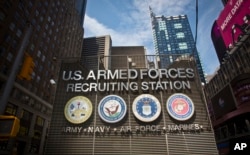Two-thirds of immigrants recruited by the military under a program targeting medical specialists and language specialists pass their security screening and go on to serve in the U.S. armed forces, according to the Pentagon.
"Two of three MAVNI applicants, on average, make it through," Pentagon spokesman Air Force Major Carla Gleason told VOA on Wednesday, using an acronym for the Military Accessions Vital to the National Interest program. This acceptance rate does not include the hundreds of immigrants still waiting to pass their security clearances.
The 2-to-1 ratio of accepted MAVNI recruits is about the same as that of American recruits who go on to serve in the military, Gleason added Thursday.
In fact, just 29 percent of Americans ages 17 to 24 meet the standards to join the military without a waiver, said Pentagon spokeswoman Jessica Maxwell.
MAVNI came under additional scrutiny after The Associated Press reported last week that more than 40 immigrants recruited under the program had been "abruptly discharged" from the Army.
In response to the AP report, the Pentagon said "there is no new policy" concerning immigrants who wish to join the U.S. military, with the Army adding that "any recruit … who receives an unfavorable security screening is deemed unsuitable for military service and is administratively discharged."
The MAVNI program ended in September 2017. However, hundreds of MAVNI recruits who were still in the process of joining the military at that time were to be "grandfathered in" if they passed appropriate security checks, according to Gleason.
Foreign nationals must complete security screening, basic military training and 180 days of "honorable service" before they can become naturalized U.S. citizens. Those in the reserve components of the military must complete security screening, basic military training and one year of honorable service before they can become naturalized.
Since 2009, more than 10,000 non-U.S. citizens have joined or signed contracts to join the military through the MAVNI program. As of April this year, about 1,100 of those MAVNI recruits were still in the Army's delayed entry program, a process where individuals sign an enlistment agreement but are not yet service members.
A U.S. defense official told VOA and other reporters that the hundreds constituting this final group of MAVNI recruits most likely could include those with backgrounds that are more difficult to clear through security.
The official, who spoke on the condition of anonymity, said the discharge of approximately 40 immigrant recruits from the Army as reported by the AP was part of a "normal process" and would "likely keep happening" as the final MAVNI recruits are assessed.
Service members in the U.S. military come from more than 240 countries and territories, according to Defense Department data from December 2017.





